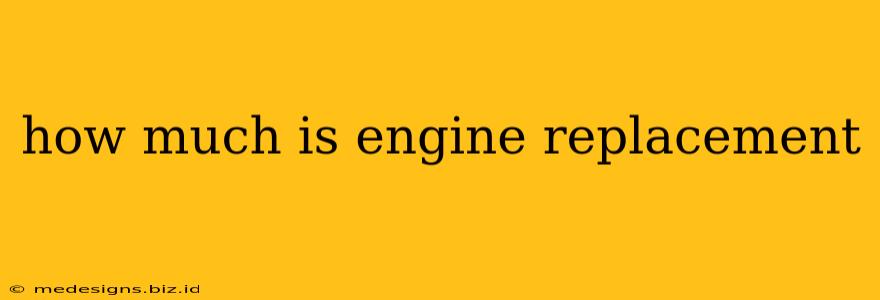Replacing a car engine is a significant undertaking, both mechanically and financially. The cost can vary wildly depending on several factors, making it crucial to understand the variables before you face this potentially expensive repair. This guide will break down the cost of engine replacement, helping you budget effectively and make informed decisions.
Factors Affecting Engine Replacement Cost
Several key factors influence the final price tag for an engine replacement:
1. The Make and Model of Your Vehicle:
Luxury cars and high-performance vehicles typically command higher prices for parts and labor compared to more common models. OEM (Original Equipment Manufacturer) parts are often more expensive than aftermarket alternatives.
2. The Type of Engine:
The engine's size, complexity, and type (e.g., V6, V8, inline-4) directly impact the cost of replacement. Larger, more complex engines naturally require more labor and more expensive parts.
3. The Condition of the Replacement Engine:
You have several options for replacement engines:
- New Engine (OEM): The most expensive option, offering a warranty and guaranteed performance.
- Remanufactured Engine: A rebuilt engine that has been thoroughly inspected, repaired, and tested, offering a balance between cost and quality.
- Used Engine: The most budget-friendly option, but carries higher risks due to unknown wear and tear. Always purchase from a reputable supplier.
4. Labor Costs:
Labor costs vary significantly depending on your location, the mechanic's experience, and the shop's hourly rate. This is often the largest portion of the total cost. Expect to pay a premium for specialized shops dealing with specific car makes and models.
5. Additional Repairs:
Engine replacement might uncover other problems during the process, such as damaged belts, hoses, or sensors. These unexpected repairs can significantly increase the overall expense.
6. Location:
Geographic location significantly impacts both parts and labor costs. Urban areas and regions with higher living costs generally have higher repair prices.
Cost Breakdown Examples:
While providing an exact figure is impossible without specifics, here's a general range based on common scenarios:
- Used Engine Replacement (Basic Car): $2,000 - $5,000 (This includes a lower-cost used engine and moderate labor costs. However, there is more risk involved)
- Remanufactured Engine Replacement (Mid-Size Car): $4,000 - $8,000 (Offering a good balance between cost and reliability)
- New Engine Replacement (Luxury Car): $8,000 - $20,000+ (Expect significantly higher costs for luxury vehicles)
Remember: These are just estimates. Always get multiple quotes from reputable mechanics before committing to any engine replacement.
Saving Money on Engine Replacement:
- Shop around for parts: Compare prices from different auto parts stores and online retailers.
- Consider a less expensive repair: If the engine damage is minor, explore less costly repair options before resorting to complete replacement.
- Do your research: Understand your car's engine and the potential repair costs beforehand.
- Check for warranties: Many remanufactured engines come with warranties, offering some protection against unforeseen problems.
Replacing a car engine is a substantial investment. By understanding the factors that influence the cost and shopping around for the best prices, you can minimize the expense and ensure a smooth repair process. Remember to always choose a qualified mechanic with experience working on your specific vehicle.
